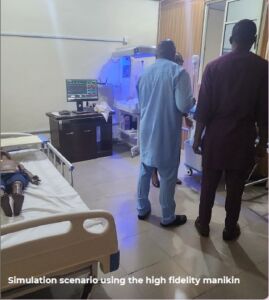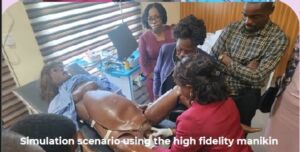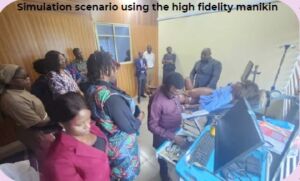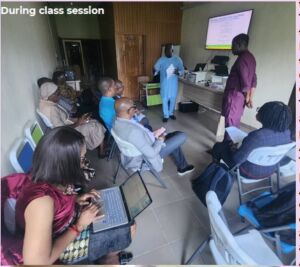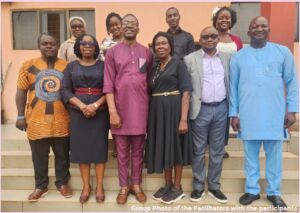As part of the Centre of Excellence in Reproductive Health Innovation (CERHI) ‘s commitment to improving the skills of healthcare practitioners, the Centre Leader of CERHI, Prof. Nathaniel Inegbedion, through the simulation Committee, organized a two-day workshop for training facilitators in healthcare simulation. The training, which was held on the 29th and 30th of September, 2025, took place at the CERHI Simulation Laboratory located in the CERHI complex of the University of Benin. A total of twelve Consultants/lecturers from six departments participated in the training. The departments represented were Child Health, Public Health and Community Medicine, Internal Medicine, Medico-surgical Nursing, Obstetrics and Gynaecology, and Surgery. The activities on the first day of the training included the introduction of participants and facilitators, as well as a warm welcome from the Centre Leader of CERHI to the participants. This was followed by didactic lectures delivered by Profs. Anthony Atimati, Andrew Obi, Rose Ugiagbe and James Osaikhuwuomwan, and Dr Jed Sodje. The lectures centered on the relevance of simulation in health care settings, psychological safety, educational theories, pre-brief, and the rudiments of debriefing. A demonstration on normal delivery using a pregnant high-fidelity manikin was conducted by Dr. Kentoby Maduako. Participants were enthused by the possibilities of real-life situations that can be achieved with the high-fidelity manikins. The activities of the day were rounded up with a lecture on how to design a case scenario and how to run a Sim. Activities of the second day kicked off with a recap of the lectures delivered on the first day especially on designing a case scenario. The participants/Learners were divided into two teams for case demonstration. The first case was on how to manage a patient with malignant hypertension using an adult male high fidelity manikin, which was facilitated by Dr. Tada Ehondor of the Internal Medicine department. This was followed by a debriefing session were the analysis and discussion of the case were done. The second demonstration was a case of neonatal resuscitation, which was facilitated by Dr. Ebe Idemudia. It was a particularly traumatic experience as the managing team could not adequately resuscitate the baby, leading to its demise. This brought to the fore the reality of what happens with patients who can actually die when the knowledge and skills of health care providers are sub-optimal. The debriefing session that followed immediately unraveled the omitted actions which led to the death of the baby and how this can be prevented in the future. Participants were reminded that the training is an ongoing exercise that will culminate in the certification of successful participants. Participants were urged to draw up a case scenario each and submit it within one week. The case scenarios will be reviewed, and the approved ones will be demonstrated by the authors, who will act as facilitators. A wrap-up of the training was given by Prof Anthony Atimati, the Coordinator of the simulation lab. Dr. W. Kubeyinje was appointed as a representative of the participants and was asked to open a WhatsApp group for ease of communication. The training was brought to a close, followed by a group photograph of both facilitators and learners.
